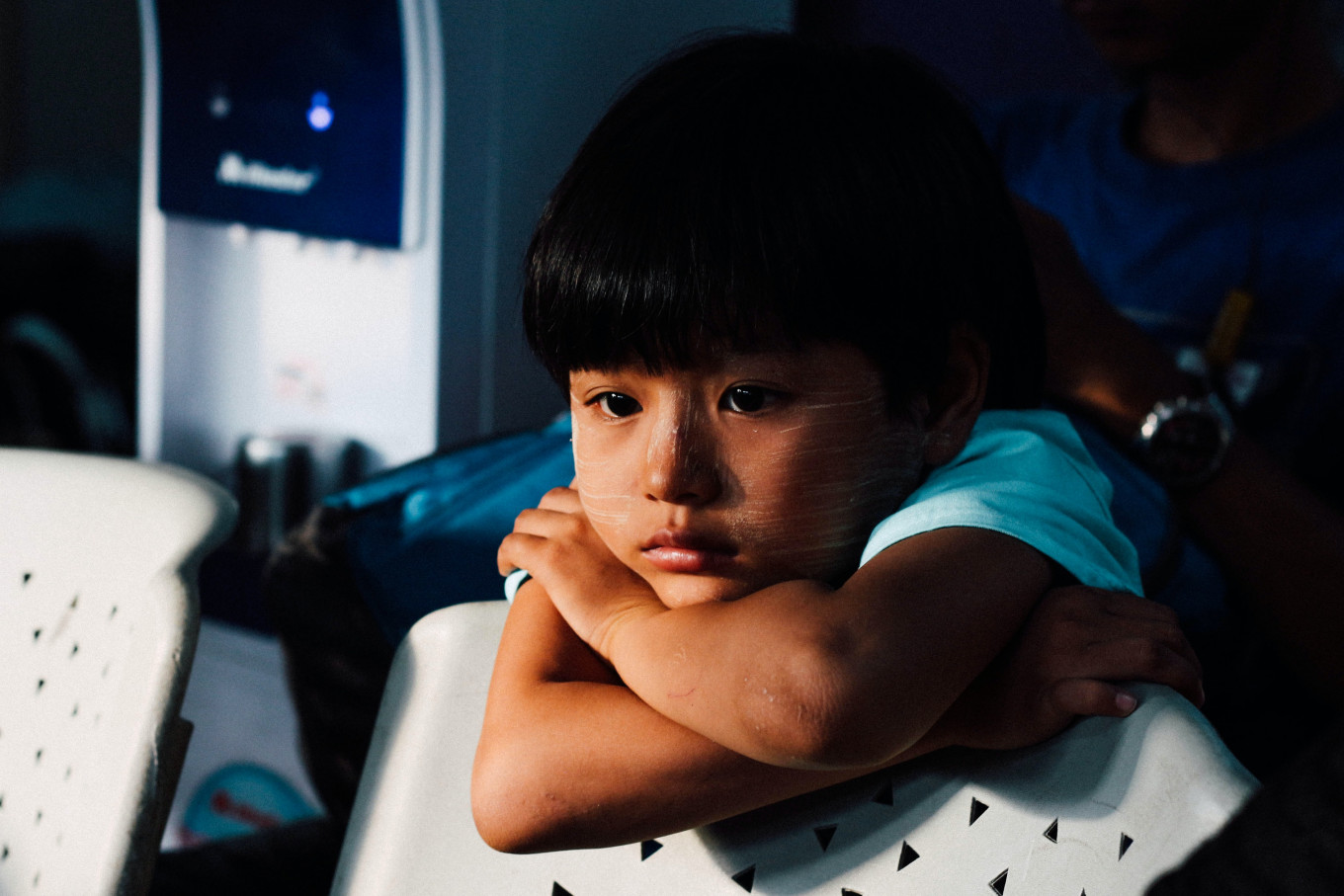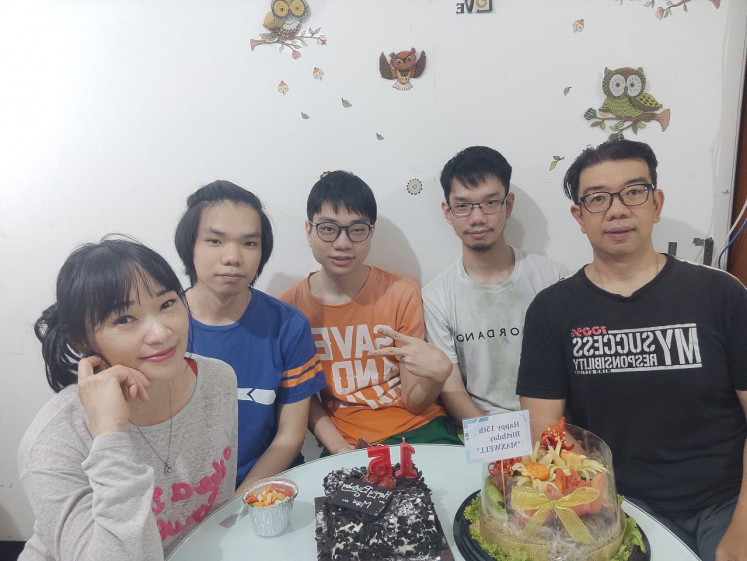Popular Reads
Top Results
Can't find what you're looking for?
View all search resultsPopular Reads
Top Results
Can't find what you're looking for?
View all search resultsChildren of toxic parenting open up about lifelong emotional battles
Change text size
Gift Premium Articles
to Anyone
N
ot all families are blessed with bliss. For people born to so-called “toxic parents”, the effects may persist a lifetime.
Toxic parenting. The term seems to be trending lately as many Indonesian parents learn to be better mothers or fathers by avoiding their own parents’ mistakes. From dominating their children to being verbally abusive, parents’ faults may have lasting effects on their children.
For some, such toxic behavior is the result of generational trauma or economic struggle. For others, it is the consequence of a bitter truth: that some parents have never grown up.
“Toxic parenting comes from ignorance,” psychologist Sani Hermawan said. “Parents refuse to learn the right parenting methods for their child, and they repeat the toxic patterns they learned from their own parents. They just imitate without consciously considering the long-term effects.”
“Instead of helping the child grow and develop, toxic parents prune them like a bonsai tree,” she continued, explaining the negative effects of toxic parenting on children. “This creates a child whose development is arrested. The child becomes insecure and prone to self-blame.”
Hard to look back
Mesach Albert Gunawan remembers the scene like it was yesterday. “One day, my mother took me to the market to pick out two blankets,” he said. “I asked her what they were for. She said, ‘They’re for your sisters.’”
A harmless act, until he noticed the finer details. Albert’s father had repeatedly cheated on his mother, and his mother always forgave him. That was until, one day, his father returned bearing news that he had had two daughters with a longtime mistress.
A changed man: Mesach Albert Gunawan (right) and his family pose for a holiday photo. He has engaged in ‘remedial parenting’ for the past six years. (Courtesy of Albert Gunawan) (Courtesy of Albert Gunawan/Personal collection)“I don’t think my mother was angry or vengeful,” Albert said. “She just wanted to make sure those two girls were taken care of. They had no fault in this. They didn’t deserve to be abandoned by my father, too.”
Now 50 years old with three children of his own, Albert looks back on his family background with a hard-earned acceptance. But the human resources consultant has had to fight for his current peace of mind. He acknowledged a lifetime of “living the wrong way”, getting married for perhaps flimsy reasons and losing his own path as a father. Putting things right required a lot of soul-searching – something he fears not many are willing to do.
Legacy of ruin
Putri admits from the start that her parents forged ahead with marriage under less-than-auspicious circumstances.
“They didn’t marry for love,” said the 29-year-old digital content creator, who opted to use a pseudonym for this article. “They were over 30 years old and were afraid their time was running out.”
It didn’t seem to matter at the beginning. They had three daughters in quick succession and fell into middle class routine. Her father, a gruff, old-school patriarch from a humble family, threw himself into work to provide his family a comfortable life. But according to Putri, her mother was ill-suited to her married life.
“She had never had any boyfriends before my father, so she had no experience with relationships,” she said. “Her life was straightforward. Church, studies, home, nothing else. Then she got married to my father, who was stubborn and rebellious. It was a shock for her.”
A workaholic husband who refused to communicate his feelings was a difficult partner for a sheltered wife who thought marriage would be a fairytale that would suddenly increase her status. Before long, the relationship turned cold and her disappointed mother became bitter.
A similar dynamic happened during Albert’s childhood. “I came from a fatherless generation. Physically, my father was there, but he wasn’t present for the family,” he said. “My father believed that his job was simply to provide for his family. Other than that, he was pretty much absent.”
Then there was his father’s rampant adultery. “There was a pattern,” Albert recalled. “My father would have an affair, my mother would inevitably find out, and she would take me to his mistress. ‘This is his son,’ she would say, pointing at me to my father’s mistress. Then, if the mistress was a Christian, she would give her a Bible or ask [the woman] to pray for her. The affair would end, until my father did it all over again.”
This process left an indelible mark on young Albert and his brothers: an absent father who constantly hurt their mother, a mother with extensive patience who took their father back over and over again and a family constantly on the brink of collapse.
“I learned forgiveness from my mother,” Albert said. “Not from any priest or holy man.”
A strong maternal figure also kept Rani, a 27-year-old project officer, who has elected to use a pseudonym, in check throughout her tumultuous childhood.
“My mother was married twice, had a daughter with both husbands, and each time she was a survivor of violence,” she said.
The second marriage with Rani’s biological father was also tarnished by violence.
“Even when I was a baby, I experienced violence from my biological father,” she said. “My mother worked hard to get out of that marriage.”
As the marriage fell apart, her biological father’s family “refused to recognize her existence” and they were cast out alone.
“It was just myself, my sister and my mother,” Rani said. “We used to call ourselves The Three Musketeers.”
With her father completely out of the picture by the time she was 3 years old, Rani’s family was pushed into a financial black hole they never completely emerged from.
“I have had to work ever since I was very young,” she said.
Rani did not question her family situation until she was in elementary school. “I got confused and sad when I saw my classmates being picked up from school by their fathers,” she recalled. “I asked where my father was, and my mother replied point-blank that their relationship wasn’t great.”
While Albert and Rani had a disappointing father figure, Putri, on the other hand, struggled with her mother’s brutal honesty.
“My mother was a perfectionist, and I never matched her expectations,” she said. “I became a scapegoat. She would say I wouldn’t make it, even before I tried to do anything. When something went wrong, she took out her frustrations on me.”
One time, Putri was blamed after her little sister broke her arm.
“She said my sister jumped around because she was copying me,” Putri said. “Somehow, she blamed me for an accident like that. I grew up afraid of making mistakes. If my teacher told me off at school, I would cry. People thought I was a crybaby. They didn’t know that I lived in a constant fear of failure.”
Growing up, these familiar patterns took her to some rough waters. “I became a people pleaser. I thought I had to be nice and everybody had to like me all the time,” she said. “I got into toxic relationships over and over again because I was seeking external validation. And I didn’t have a lot of loyal friends around me because I never opened up to anyone. I was afraid they would judge me if they knew who I really was.”
The family gradually settled into an upper-middle class life. But for Putri’s mother, none of it was enough. “She compared her life with her friends. One was living in the United States, another owned gas stations in Java, and another one worked at a [government] ministry,” Putri said. “She felt dissatisfied with her own family and life. She blamed my father and grew to hate him for it.”
“I think she singled me out because my personality was similar to my father’s,” Putri observed. “I took risks. I was stubborn. I was rebellious. She didn’t like that.”
The situation became worse when, almost a decade ago, her father had a stroke, leaving her mother as the primary caregiver. Her mother did not take it lightly. “We were taught to blame and attack my father,” Putri said. “My sister even told me she felt brainwashed to hate my father.”
When her father passed away in October 2019, Putri felt the jig was up. “My father at least encouraged me to pick myself up after I failed,” she said. “After he passed away, I felt like I was mentally declining. I thought my choice was to die first or wait until my mother passed away. Until then, peace didn’t seem to be an option.”
Now married and trying her hardest to live her own life, she admits it is difficult to forgive her mother and move on. But those are not easy tasks, especially when she noticed some of her relatives grow up to be toxic parents in their own right. “I really want kids, but I’m afraid I won’t be a good parent,” Putri said. “I don’t want my children to wish they were never born. I’m afraid of what would happen if I had a kid before I completely healed myself.”
Insight: Mesach Albert Gunawan (right) says parenting is a skill that is learned, not something that comes naturally. (Courtesy of Albert Gunawan) (Courtesy of Albert Gunawan/Personal collection)Breaking the pattern
In his own way, Albert consciously attempted to distance himself from his father. He grew up, worked his way up the corporate ladder, got married, had three kids of his own and convinced himself he was his own man.
“I never cheated on my wife, and I never abandoned my family,” he said.
But traces of the old life remained.
“I think, subconsciously, I took in a lot of the values my father taught me,” Albert said. “My father thought a happy person must fight to be financially rich, and that desire to provide was everything. I became a father who just focused on providing for my family. I was happy to change my children’s diapers, but I wasn’t great at communicating and spending time with them when they grew older.”
A rude awakening shook him from his stupor. Albert fell victim to a scam and lost much of his hard-earned money. Now financially middling, middle-aged and tired, he sat down with his brothers and took stock of his life.
“We realized that none of us really respected our father,” he said. “We forgave him out of respect to our mother, but we didn’t really hold him in high regard. I started to think, ‘What if I keep going down this path and one day my kids feel the same way about me?’ I wasn’t ready for that. Something needed to change.”
He began a process of what he called “remedial parenting”, where he returned to his family determined to live life as a changed man. Albert started by mending his relationship with his wife, believing that his kids would not respect him “if they don’t see that I love their mother”.
Next came the difficult task of actually communicating with his three teenage sons.
“I’ve always thought about how I, as a parent, can change my kids. But after reading up on parenting, I started thinking, ‘What do I need to change in myself so that my kids can change too?’” he said.
Back then, his youngest son was struggling at school.
“The old me would say, ‘You’re wasting my money. If you don’t graduate, I’ll pull you out of school,’” he said, regretfully. “But I decided to sit down with him and say, ‘Son, it is my job to provide you with education, even if you don’t graduate. But the consequence is you’ll have to move to another school that might not be as good, with new friends you have to adapt to.’ After that, he did a lot better at school.”
Rani went through a similar process of soul-searching when she met the man who would become her husband. “He came from a relatively functional family, and I saw up close a father’s role in making decisions and existing within the framework of a traditional family,” she said. “That’s something I never really learned.”
The couple evaluated their respective traumas and issues repeatedly, giving honest appraisals to each other. “Because of my background, I realized I always pushed myself too hard and that I had major trust issues,” Rani said.
“I told him some parts of me might appear strange and foreign to him. He was relaxed and gave me space, but reminded me that there were issues I have to resolve, so it was fine to make mistakes sometimes.”
For Rani, her marriage became a conscious attempt to forge a new path and pattern. “We want to restructure the constructs I’ve long held,” she said. “It’s a chance to design a new kind of relationship with a healthy communication pattern and mutual respect – in our own way, regardless of the toxic culture we may have come from.”
Albert feels the same way. “I think Indonesian parenting starts from the false understanding that nurture is natural,” he said. “Just get married, have kids, and you’ll figure it out. I disagree. Parenting is a skill you need to consciously learn and develop. The skillsets you need when your child is a baby are different to when they’re teenagers. You’re constantly growing, too.”
“I hope the next generation doesn’t have kids just to fulfil a biological or social need,” he concluded. “That’s not the point. Our duty as parents is to grow along with our kids.”













